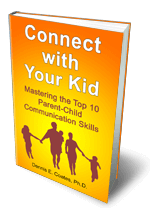When you were in high school, did you take that Parent-Child Relationship Skills course? I’m sorry – trick question. No such course has ever been included in a high school curriculum. Well, how about college? No? Any other course in your church or community or even online where you could practice communicating effectively with kids?
Right. I didn’t either. Practically no one has ever had such training. Instead, 99.99% of parents are still relying on ways of communicating they absorbed unconsciously while living with their own parents and interacting as a child with adults and friends. Just to be clear, behavior patterns learned “on the street” this way are far from the best practices. The way most parents react when their children have problems or don’t meet expectations usually just makes things worse.
Here are some of the most common ways parents react, all of them ineffective:
Exercising authority. You want X but your kid wants Y, which is unacceptable. I’m in charge here, my rules, I know better, so while you’re still living under my roof you’ll do what I say. You’ve got the power, which is hard to argue with. You can order, command, warn and threaten. But playing this card doesn’t promote a loving, sharing relationship. It doesn’t nurture mutual respect and understanding. It makes kids resentful, makes them want to spend more time away from the family, to be defiant and rebellious.
Lecturing. You definitely know more than your kids. You’ve already been through it. You have enough life experience to know the solutions to most of their problems. So you can tell it like it is, instruct, preach, give advice, or simply take over the problem and fix it. But it will be your solution, not theirs. The communication will be one-way, it will make them feel inadequate, and they won’t learn to think for themselves.
Arguing. You and your kid disagree, but you know you’re right and you have better reasoning and debate skills. You can win the argument, but whether you know it or not, you won’t really win. The child will be angry because he lost. He’ll feel he was right and secretly find ways to get what he wants anyway.
Criticizing. Nobody is perfect and everyone makes mistakes, even you. But kids seem to fall short all the time. So you blame, shame, judge, and maybe even use sarcasm, ridicule or put-downs. These reactions when you’re dismayed by a child’s behavior can attack a child’s fragile self-esteem. The result: reluctance to set ambitious goals, take on tough tasks, feel worthy in relationships or resist peer pressure.
You’re not a bad parent if you’ve been frustrated enough to react emotionally when your child upset you. Practically every parent has. As I suggested, it’s how we learned to relate to kids.
However, the first step is to appreciate that these kinds of reactions have bad consequences. The second step is to catch yourself when you feel one of these reactions boiling up in you. Then do the hard thing, the more effective thing.
 Active listening. Stop talking and start paying attention. Check what you think your child is trying to say. The goal is to get the message, even if the child has trouble communicating it. Express empathy, even though you may disagree.
Active listening. Stop talking and start paying attention. Check what you think your child is trying to say. The goal is to get the message, even if the child has trouble communicating it. Express empathy, even though you may disagree.
Get involved in dialogue. Ask for your child’s opinion, and listen to understand without debating or criticizing. You don’t have to accept their reasoning, but you can learn what your child is thinking and even share your own point of view, without trying to convince her that you’re right.
Give constructive feedback. First acknowledge the positive in his behavior, then describe specifically the behavior that troubled you, and why. Then describe the behavior you’d rather see. Give encouragement and affirm your confidence that the child can meet your expectations. Always a good idea: whenever possible catch your child doing something well, so you can mention the specific behaviors you admired. Do this more often than you address the negatives.
Resolve conflict creatively. The idea is to hear what your child wants, then find out why – what needs are driving your child’s wants? Check to be sure you understood correctly. Then describe your own needs. Together explore alternatives that will meet both your needs at the same time.
Encourage thinking. Ask open-ended questions such as, “What do you think about this?” “What’s your opinion?” “What do you think the real problem is?” “What would you like to do about it?” “How do you think that will work for you?” “Why do you think this happened?” “What would you do differently?” Kids learn to think only if they’re encouraged to think.
The goal is to help your child prepare for adult life. But you need a close, trusting relationship to accomplish this. And you want this relationship to grow throughout adolescence. When a child feels understood and respected, it has an amazing impact on the relationship.
I admit there’s a whole lot more to the above skills than I’ve summarized above. And you’ll have to practice a lot and learn from mistakes before any of these alternatives to reacting will become second nature.
 More truth-telling about parent-teen communication.
More truth-telling about parent-teen communication.
My how-to instruction on reactivity is the topic of Chapter 2 of Connect with Your Kid: Mastering the Top 10 Parent-Child Communication Skills.
You can grow the bond with your child through better listening. Download the FREE ebook, Listening to Understand.

